CrossAsia Talks: Fengyu Wang 15.6.2023
(See English below)
Wir freuen uns sehr Ihnen den Vortrag von Herrn Fengyu Wang (Universität Heidelberg) am 15.6.2023 ab 18 Uhr im Simon Bolivar-Saal (Potsdamer Straße 33, 10785 Berlin) zum Thema „The Karmic Origins Painted Anew: The Reproductions of the Hachiman Handscrolls“ ankündigen zu dürfen.
Hachiman engi 八幡縁起 oder Die karmischen Ursprünge von Hachiman erzählt von der mythischen Eroberung Koreas durch Kaiserin Jingū 神功皇后, der Geburt ihres Sohnes, Kaiser Ōjin 応神天皇, und seinen wundersamen Erscheinungen als Gottheit Hachiman, wörtlich „acht Banner“. Da die Verehrung von Hachiman seit dem späten dreizehnten Jahrhundert weit verbreitet war, wurden illuminierte Handrollen mit seiner Gründungslegende vervielfältigt und den neu gegründeten Hachiman-gū-Schreinen im ganzen Land gewidmet. Der Satz von zwei Schriftrollen in der Sammlung der Staatsbibliothek zu Berlin mit dem Titel Konda Hachiman engi 誉田八幡縁起 oder Die karmischen Ursprünge des Konda Hachiman ist eine Kopie einer Version der Hachiman-Schriftrollen von 1433 aus dem 18. bis 19. Letztere war eine der drei Hachiman-Handrollen, die der sechste Ashikaga-Shogun Yoshinori 足利義教 (1429-1441) im selben Jahr als Teil seines grandiosen Projekts der Hachiman-Verehrung neu in Auftrag gab. Die Praktiken der Herstellung von Kopien und Reproduktionen waren ein herausragendes Merkmal bei der Entwicklung der Hachiman-Handrollen, wobei die neu geschaffenen Versionen mit devotionalen, soziopolitischen und ästhetischen Werten versehen wurden. In diesem Vortrag werden die Berliner Hachiman-Handrollen und ihr Original von 1433 im größeren Kontext der Reproduktion von Hachiman engi untersucht.
Das Berliner Set war eine von sieben weiteren Versionen von Hachiman-Rollen, die 2015 im Rahmen des Hachiman Digital Handscrolls Project an der Universität Heidelberg untersucht wurden. Sie ist nun auch auf der neu gestalteten Oberfläche des Projekts Japanische Handrollen der Staatsbibliothek zu Berlin verfügbar.
Die Vortragssprache ist Englisch. Wir bitten Sie um Voranmeldung für den Vortrag unter: ostasienabt@sbb.spk-berlin.de und eine kurze Mitteilung falls Sie einen barrierefreien Zugang benötigen. Die Veranstaltung wird gefilmt.*
Der Vortrag wird darüber hinaus via Webex gestreamt und aufgezeichnet. Sie können am Vortrag über Ihren Browser ohne Installation einer Software teilnehmen. Klicken Sie dazu unten auf „Zum Vortrag“, folgen dem Link „Über Browser teilnehmen“ und geben Ihren Namen ein.
Alle bislang angekündigten Vorträge finden Sie hier. Die weiteren Termine kündigen wir in unserem Blog und auf unserem Twitteraccount an.
—
We are very pleased to announce the lecture of Mr. Fengyu Wang (University of Heidelberg) on 15.6.2023 from 6 pm in the Simon Bolivar-Saal (Potsdamer Straße 33, 10785 Berlin) on the topic „The Karmic Origins Painted Anew: The Reproductions of the Hachiman Handscrolls„.
Hachiman engi 八幡縁起 or The Karmic Origins of Hachiman, narrates Empress Jingū’s 神功皇后 mythical conquest of Korea, the birth of her son, Emperor Ōjin 応神天皇, and his miraculous manifestations as the deity Hachiman, literally “eight banners.” As the Hachiman veneration became widespread since the late thirteenth century, illuminated handscrolls of his inception legend were reproduced and dedicated to the newly founded Hachiman-gū Shrines across the country. The set of two scrolls in the Staatsbibliothek zu Berlin collection, titled Konda Hachiman engi 誉田八幡縁起 or The Karmic Origins of the Konda Hachiman, is an eighteenth-to-nineteenth-century copy of a 1433 version of Hachiman scrolls. The latter was itself one of the three sets of Hachiman handscrolls that the sixth Ashikaga shogun Yoshinori 足利義教 (1429–1441) newly commissioned in the same year, as part of his grandiose project of Hachiman veneration. The practices of making copies and reproductions were a prominent feature in the developments of the Hachiman handscrolls, where devotional, socio-political, and aesthetic values were imbued into the newly created versions. This talk will examine the Berlin set of Hachiman handscrolls and its 1433 original in the larger context of reproducing Hachiman engi.
The Berlin set was one of seven other versions of Hachiman scrolls investigated by the 2015 Hachiman Digital Handscrolls Project at Heidelberg University. It is now also available on the newly designed interface of the Japanese Handscrolls project of the Staatsbibliothek zu Berlin.
The lecture will be held in English. We kindly ask you to register in advance at: ostasienabt@sbb.spk-berlin.de, and to let us know if you need barrier-free access. The event will be filmed.*
The lecture will also be streamed and recorded via Webex. You can take part in the lecture using your browser without having to install a special software. Please click on the respective button “To the lecture” below, follow the link “join via browser” (“über Browser teilnehmen”), and enter your name.
You can find all previously announced lectures here. We will announce further dates in our blog and on Twitter.
*Mit Ihrer Teilnahme an der Veranstaltung räumen Sie der Stiftung Preußischer Kulturbesitz und ihren nachgeordneten Einrichtungen kostenlos alle Nutzungsrechte an den Bildern/Videos ein, die während der Veranstaltung von Ihnen angefertigt wurden. Dies schließt auch die kommerzielle Nutzung ein. Diese Einverständniserklärung gilt räumlich und zeitlich unbeschränkt und für die Nutzung in allen Medien, sowohl für analoge als auch für digitale Verwendungen. Sie umfasst auch die Bildbearbeitung sowie die Verwendung der Bilder für Montagen. / By participating, you grant the Stiftung Preußischer Kulturbesitz and its subordinate institutions free of charge all rights of usage of pictures and videos taken of you during this lecture presentation. This declaration of consent is valid in terms of time and space without restrictions and for usage in all media, including analogue and digital usage. It includes image processing and the usage of photos in composite illustrations. German law will apply.

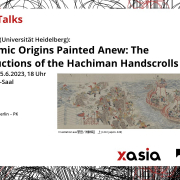 SBB-PK
SBB-PK
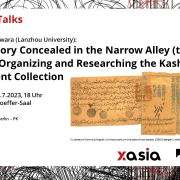 SBB-PK
SBB-PK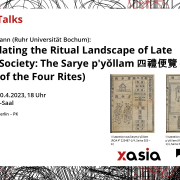 SBB-PK
SBB-PK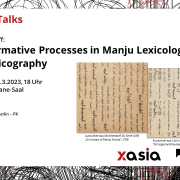 SBB-PK
SBB-PK
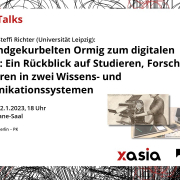
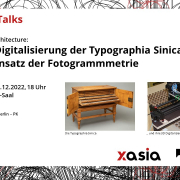 SBB; Illustrated Architecture
SBB; Illustrated Architecture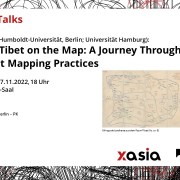
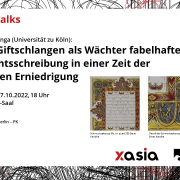 SBB-PK
SBB-PK